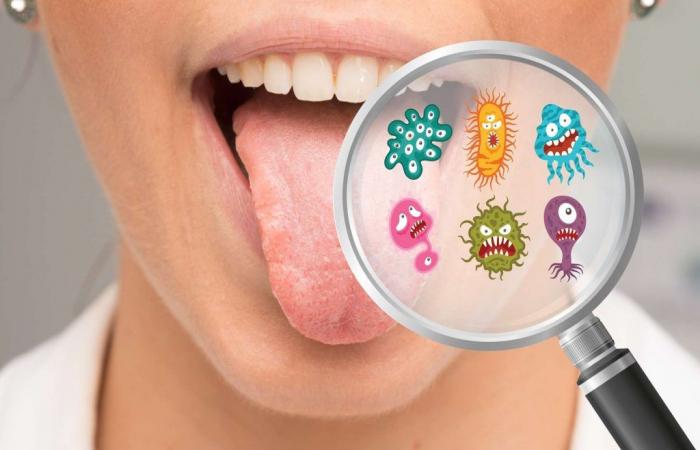Our mouth is one of the most diverse habitats in our body: it houses more than 700 speciesspecies bacteria, not to mention yeastsyeasts, viruses and a number of protozoa. This microbial community constitutes the microbiota buccalbuccal which, like the intestinal microbiota, can influence our health.
The most common diseases caused by changes in the oral microbiota are tooth decay and gum disease. But over the years, scientists have discovered numerous clues suggesting that the oral microbiota is also linked to many other serious problems elsewhere in our bodies.
Oral diseases: almost half of all human beings on earth suffer from them
Respiratory diseases
The respiratory tract begins in the mouth and ends in the lungs. Therefore, it is not surprising that in the event of proliferation of the oral microbiota, some of the microbes that compose it can be inhaled and end up in the lungs.
This situation frequently leads to pneumonia. The risk of developing this infection, often fatal in the elderly, has been associated with poor oral hygiene, which leads to the proliferation of certain bacteria such as Streptococcus pneumoniaeStreptococcus pneumoniae et Haemophilus influenzae.
Research has shown that improving oral hygiene in nursing homes, as well as providing dental care (performed by professionals), can reduce the number of pneumonia cases by a third. It is also important to ensure that dental appliances and other oral devices (e.g. mouthguards for athletes) are clean.
Some research has also highlighted an association between poor oral health and chronic obstructive pulmonary disease (COPDCOPD), as well as with alterations in respiratory function, due to changes in the oral microbiota that result from such a situation.
Heart disease
The periodontitisperiodontitis Chronic is one of the most common conditions caused by the oral microbiota. This disease results from the proliferation, due to inadequate oral hygiene, of bacteriabacteria present in the space between the gums and teeth. It results in a destructive inflammatory response, which attacks the bones and tissues supporting the teeth, leading to their loosening and then their loss.
For years, researchers have noted that there is a significant statistical association between periodontitis and cardiovascular illnessescardiovascular illnesses. This could be explained by risk factorsrisk factors common between these different conditions. So, periodontitis and heart disease are both more common among smokers.
Another hypothesis is that periodontitis bacteria may be able to travel to the heart and cause infection there. However, for now, scientists are still trying to elucidate the mechanisms that could be at work.
As mentioned previously, periodontitis triggers a strong inflammatory response. Remember that theinflammationinflammation is one of the means available to our body to fight infections: it is accompanied by the production of cells and various chemical signals necessary for the proper functioning of the immune responseimmune response. But too much inflammation can be damaging. Some researchers believe that inflammation caused by periodontitis may damage the cardiovascular system.
Notably, one study found that treating periodontitis reduced levels of inflammation in the blood and significantly improved arterial function. Other work has also shown that treating periodontitis reduces overall levels of inflammation in the body.
This research demonstrates that oral disease can have significant effects on the function of tissues elsewhere in the body. Since many people live with untreated periodontitis, sometimes for decades, the deleterious effects on their health can potentially be significant in the long term.
Colon Cancer
Oral bacteria are capable of traveling through thestomachstomach, right down to the intestines. In general, microbes that usually live in the mouth are not well adapted to these new environments, and they die quickly. However, in 2014, two studies showed that tumorstumors of the cancerscancers of the intestine were heavily colonized by a species of bacteria called Fusobacteriumwhich is normally found in dental plaque.
Healthy gums to reduce cancer risk
This work also showed that Fusobacterium exhibits a high affinity for malignant cancer cells. This bacteria is in fact capable of binding closely to the surface of cancer cells, and of invading the tumor. Since then, multiple studies have confirmed that Fusobacterium can colonize tumors throughout the tract gastrogastro-intestinal.
Research has also shown that patients with Colon CancerColon Cancer heavily colonized by Fusobacterium respond less well to chemotherapychemotherapy and have a life expectancylife expectancy shorter compared to those who are not colonized. This could be because tumors infected with Fusobacterium are more aggressive and therefore more likely to spread than those that are not infected by bacteria.
Research is continuing to better understand this relationship, and to determine whether people at risk of bowel cancer might benefit from vaccinationvaccination against this oral microbe.
Alzheimer’s disease
One of the most controversial links between oral health and pathologypathology concerns the Alzheimer’s diseaseAlzheimer’s disease.
In people with Alzheimer’s disease, suffering from chronic periodontitis is associated with greater cognitive decline. However, because periodontitis and Alzheimer’s disease are both associated with aging, it is difficult to determine whether there is indeed a cause and effect relationship.
However, in 2019, research revealed that the brains of people with Alzheimer’s disease were colonized by Porphyromonas gingivalis, one of the main bacteria responsible for periodontitis. The fact that the brainbrainan organ normally preserved from microorganismsmicroorganismscan be infected by oral bacteria remains very controversial, and additional research on this subject is necessary.
In addition, as in the context of heart disease, some specialists have also suggested that the inflammation caused by periodontitis suffered by patients with poor oral health could be an aggravating factor in Alzheimer’s disease.
The importance of good oral health
Poor oral hygiene can therefore have multiple harmful consequences for health. However, it is possible to control its microbiomemicrobiome oral, and thus prevent related diseases.
To do this, it is necessary to implement a daily oral hygiene routine. This involves brushing your teeth twice a day, as well as regular use of dental floss, in order to control plaque and reduce theincidenceincidence cavities and gum disease. As for the latter, quitting smoking can greatly reduce the risks of their occurrence. It is also advisable to consult a dentist at least once a year, in order to have a descalingdescaling and benefit from advice from a professional.
Following these recommendations will make your smile brighter, and could also extend your life expectancy by a few years…






